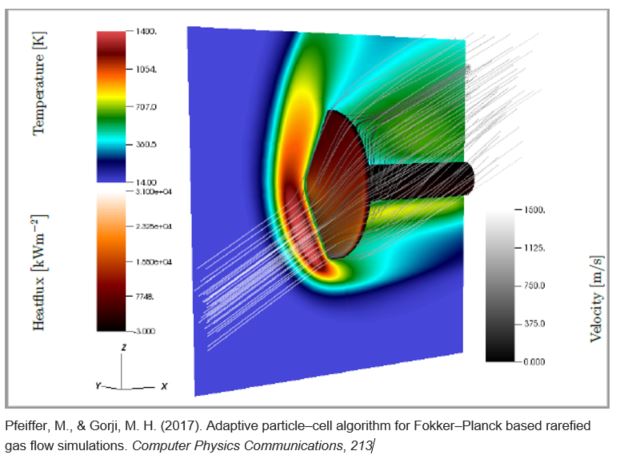Model Cascades for Stochastic Particle Simulations of Rarefied Polyatomic Gases
The SNF-DFG funded project “Model Cascades for Stochastic Particle Simulations of Rarefied Polyatomic Gases“, with the group of researchers Veronica Montanaro (Empa) and Lukas Netterdon (RWTH Aachen) as PhD students, Hossein Gorji (Empa) and Manuel Torrilhon (RWTH Aachen) as Principle Investigators.
Kinetic interactions of particles comprise challenging problems across different fronts of modelling, computation and analysis of fluids. From hypersonic and reentry flights to the high-energy chip lithography and membranes, we rely on kinetic descriptions to elucidate the underlying meso-scale transport processes. As the flow condition departs noticeably from thermal equilibrium, the accuracy of conventional, linear-response-type closures deteriorates. In the past decade, continuous stochastic models governed by the Fokker-Planck equation were investigated as a novel strategy to construct meso-scale models honouring the physical constraints of nonequilibrium flows. Many crucial pieces are still missing to reach a general-purpose computational framework. In particular, real gas complexities arising from internal degrees-of-freedom hinder Fokker-Planck approximation of polyatomic kinetics. Moreover, an adaptive and cascade type rationale needs to be developed in order to equip us with appropriate means to reach the full capability of the Fokker-Planck model, both in terms of accuracy and efficiency.
The central idea of this project is to bring together a mathematically well-defined polyatomic Boltzmann equation and its corresponding hierarchical Fokker-Planck approximations. The outcome gives us a numerical toolbox appropriate for studying complex gas transport processes through mesoporous membranes, with overarching applications in gas separation and CO2 adsorption.



